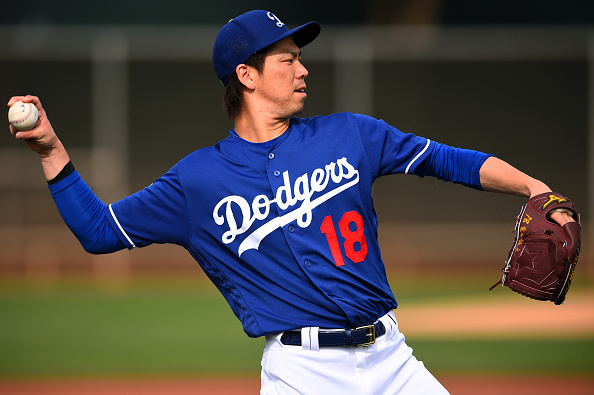With the baseball season fast approaching and Spring Training upon us, Fantasy owners are beginning to compile their rankings and projections for 2016. Sorting through established players and household names is one thing, but leagues are never won by big-named stars performing at their expected statistics. Instead, crowns are donned by the owners who were able to sift through the first 200 players selected and draft upside “deep sleepers” (ones who are able to greatly outperform their ADP and provide exceptional value to their owners). Which players qualify for that distinction this season? Read on and find out.
Player: Kenta Maeda 
Team: Los Angeles Dodgers
Age: 27
Position: SP
2015 Statistics: 15-8 record over 206 IP / 2.09 ERA / 1.01 WHIP while pitching in Japan for the Hiroshima Toyo Carp
Current ADP: 201 (Fantasy Pros)
Background
Many assumed after his stellar 2014 campaign with the Hiroshima Toyo Carp that Maeda would pitch in the major leagues, but he remained in Japan an additional season, apparently just to prove he could post even better numbers. In terms of physical prowess, Maeda is the polar opposite of fellow countryman Yu Darvish. While Darvish has an intimidating stature on the mound at 6-foot-5, 215 lbs., Maeda is a very diminutive – a mere 6-foot tall and 175 lbs. soaking wet. Their arsenal of pitches is also dramatically different, as Darvish relies upon an overpowering fastball, while Maeda induces more contact and throws with less velocity. You may be wondering why I’ve continued to make the comparisons to Darvish then, considering their dissimilarities. Simply put – I’m trying to distance comparisons for our readers from one player to the other.
The Los Angeles Dodgers signed Maeda to a massive eight-year, $25 million contract in early January, a move that most experts assumed was a last-ditch effort to improve a staff that lost ace Zack Grienke. The Dodgers represent a fantastic landing spot for Maeda, as he will enjoy the comforts of pitcher-friendly Dodger Stadium, while backed by one of the NL’s most potent offenses.
Positives
1.) Excellent Command - Since Maeda doesn’t have a plus-fastball that can approach triple-digits (his average velocity sits more in the 90-93 range), he mainly relies upon his off-speed pitches to induce weak contact. Known mainly for his ability to minimize walks and hard contact, Maeda had a 41/175 BB/K rate in 2015 over the span of more than 200 innings pitched. To give owners an idea of where those statistics would place him in comparison to MLB pitchers from last season, his 4.26 K/BB ratio would have ranked him sixth, just behind Dallas Keuchel. Over the span of his eight year career in the JPCL Maeda averaged a 2.64 ERA and 1.04 WHIP.
2.) Innings eater - Maeda has surpassed the 200 innings threshold in four of the eight seasons he started in Japan, and has averaged 200 innings (on the dot, no less) over the past six seasons. Still just 27 years old, he is entering the prime of his career, and has proven that he can handle the rigors of a heavy workload.
3.) Landing spot - As mentioned earlier, Maeda signing with the Dodgers was a fantastic fit for him. Currently expected to slot in as the team’s fourth starter behind Clayton Kershaw, Hyun-Jin Ryu and Scott Kazmir, Maeda isn’t dealing with outlandish expectations. He isn’t expected to immediately become the teams front-end starter (as was the case with fellow Japanese import Masahiro Tanaka), or to carry the Dodgers to the playoffs. Simply put, his place in the order fits his skillset perfectly – he will provide the team a chance to win by pitching into the seventh inning each outing, while providing a moderate amount of strikeouts.
Negatives
1.) Injury risks – At first glance, Maeda’s build will remind owners of Tim Lincecum or Roy Oswalt. While it isn’t necessarily fair to point out direct correlations between a player’s height/weight to risk of injury, it certainly doesn’t play into their favor. Likewise, although each player should be judged “healthy until proven injured”, Maeda drew concerns from the Dodger’s medical staff due to his pitching elbow. The team still had enough faith to sign him to a long-term contract, but built it in such a way that there are performance-based incentives which he needs to reach to maximize its earning potential. These existing factors coupled with the poor history of Japanese pitchers staying healthy raises some eyebrows.
2.) Lack of dominance – Maeda averaged just a 7.4 strikeout per nine innings average during his eight seasons in Japan. Given his inability to generate strikeouts and overpower hitters with his pitches (due either to movement, location or velocity) in a less talented league, one has to wonder how that will translate to success in MLB.

